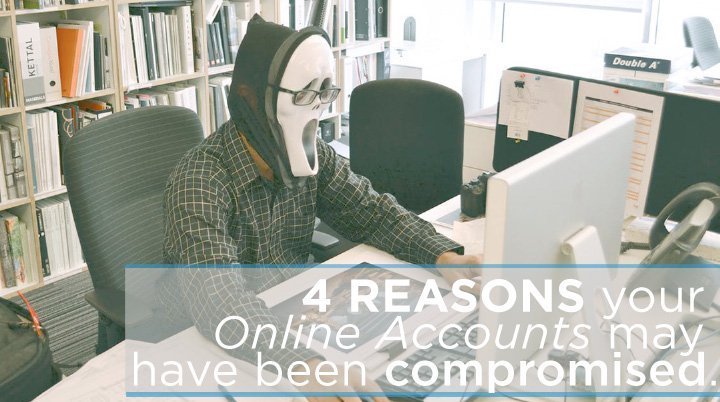Survey showed that online fraud could happen to one in every ten people, and there’s a chance you can be an unsuspecting victim. We’ve had our fair share of fraud incidents and consistent attempts at breaching some of our critical online accounts – Gmail, Paypal, online banking and much more.
Not many people can immediately notice it while others will only discover it after they’ve already been victimized.
Here are four sure signs that will help tell you if your online accounts have been compromised.
Suspicious Account Activity
One of the more prominent signs that your account has been compromised is that it’s showing weird activities. Here are some examples of uncommon behaviors that a compromised account may exhibit:
E-mail accounts
Messages you didn’t send are bouncing back.
Messages you didn’t send are appearing in your sent mail.
Your contacts are receiving e-mails that you did not send.
Your account folders (inbox, sent, deleted, etc.) has been emptied.
Your e-mail settings have been changed but not by you.
You keep on getting bumped offline when you sign in to your account.
You are no longer receiving new e-mails.
During sign-in or when sending a message, you’re asked to pass an image challenge.
Social Media Accounts
Your account is posting links on your wall or news feed on its own.
Your account is sending messages to your contacts that you did not send.
Your personal information (name, birthday, address, etc.) has been changed.
You are being logged out from your account.
You can no longer log in to your account.
Online Bank Accounts or Credit Cards
Unauthorized purchases.
Unauthorized subscriptions. (ex. subscriptions to online magazines, a monthly supply of a certain product)
System alerts
Most, if not all, emails and social media platforms have built-in security systems that notify their users of any account changes being made to the account; Some even offer layers of added security like secondary pins or 2-factor verifications aside from passwords.
If you are receiving any of the following prompts or alerts without you’re doing it is possible that your accounts have been compromised:
Email alerts for requests of a password change or reset.
A secondary device is receiving pins or prompts for login authentication without you’re doing — ex. G-mail has a 2-step login feature where you have to link a device to your email. Each time you log in to your account, your device would receive a prompt to authenticate the login.
Emails or alerts that you have logged in from a different location.
Unknown Activity History
If your accounts have recorded activities that you did not do or remember, then your account may have been compromised. Here are a few examples:
Google has their own My Activity page where it records all the activities that you do with the various apps that they have, if any of these activities were not done by you then it is possible that you have been compromised.
Microsoft has a Recent Activity feature where it records when and where you’ve used your Microsoft account, the page has its own built-in alert system when it detects weird activity in your account. But still, if you see any activity you haven’t done then it’s possible that you may have been compromised.
Read more at http://www.yugatech.com/guides/4-signs-your-online-accounts-may-have-been-compromised/#u20kOWSmlic2vETp.99